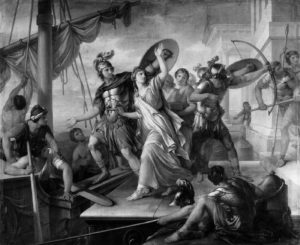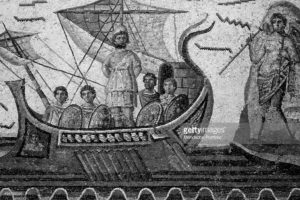Analysis – Characters and events
The epics, Iliad and Odyssey, are placed in the backdrop of war and voyage at sea. Both war and voyage have always posed unexpected challenges, have given rise to intense emotions and unpredictable outcomes. Both war and voyage throw a challenge to a person’s very life. In addition to this, the intervention of supernatural powers manifested in the form of Gods, visit to unfamiliar lands and encounter with alien culture were elements that caused fear to the Greeks and they are constant themes in the works of Homer. These aspects, which have subconsciously bothered the Greeks to a large extent in their everyday life, have been consciously made use of by the poet. Intense emotions and situations might not have occurred if Homer’s characters were all in the comforts of their home and homeland. A conflict in ideas or moral values gives rise to varied emotions and serves as the raw material for a poet.
Sea-the natural foe
To Greece, an archipelago of more than 3,000 islands, the sea has always been a natural foe to conquer. Before Common Era, when naval technology wasn’t as advanced as it is today, there was a deep-seated fear of the sea. There was great uncertainty in travelers’ return to their homeland when they sailed to foreign islands. In addition, they were scared of encountering unfamiliar culture in foreign lands. This is reflected well in the Odyssey, where the hero, Odysseus, comes across lotus-eaters, giants with one eye, monsters with several heads and witches who could turn men into pigs. Although these are certainly mythical characters, they reflect the inherent fear the Greeks had for voyages. The God of the sea working against the ships of Odysseus and all the unfavorable winds being released from a bag at once, reflect what sailors always worried about. The fear of the sea is reflected in the words of one of the characters thus “…For to my mind there is nothing worse than the sea to confound a man, however strong he may be.” (O. B8. 146-140) However, a voyage at sea need not always be hopeless – it can end on a positive note too, as seen by Odysseus’s arrival on the island of the Phaeacians, who ensure his safe trip home and reward him with marvelous gifts.
Humans as Foes
Homer would have heard of the various conflicts and battles between different kingdoms of Greece, which was a common occurrence since the archaic times. Northern Greece was also under the continuous threat of barbaric tribes (and of the Persians during the later periods). This, along with the semi-historical event of the Trojan War has served as the material for the Iliad.
Lust, friendship, and the ethics of relationships
In both the Iliad and the Odyssey, Homer portrays the lust for another man’s wife. In the Iliad, Paris abducts Helen, the wife of Menelaus. In the Odyssey, several suitors ask for the hand of Penelope, the wife of Odysseus and Calypso promises immortality and an immortal relationship to Odysseus. An ethical value is compromised and the vow of marriage is broken in the first case, with Helen going away with Paris. The Iliad itself starts with Agamemnon refusing to return Chryseis to her father, who is a priest of Apollo. Apollo’s wrath in the form of a plague which spreads over the camps of the Achaeans and Achilles’ reprimand force Agamemnon to hand over the girl back to her father. However, he seeks Breseis, the very consort of Achilles, in return. This brings a rupture in the army, with Achilles retiring from the war causing great loses to the Achaeans. Agamemnon, who has assumed the commandership of the entire Achaean army and who is fighting to win back his brother Menelaus’s wife, commits a similar blunder right in the middle of the seemingly endless war. He even says that he would prefer Chryseis to his own wife Clytemnestra, who he has left behind in his home at Mycenae.
These poignant epics also portray deep friendships. The camaraderie between Achilles and Patroclus in the Iliad is the epitome of friendship. In the Odyssey, the intense longing for a loved one, the friendship between Odysseus and his wife Penelope, transcends even the rulebook of marriage; it keeps their lives going. In the former case, the poet shows us that earnest friendship and a committed relationship can exist even between men (i.e., Achilles and Patroclus) and in the latter, shows the same between a husband and wife. The softening of Achilles after the death of his dear one and him returning to battle gives a total turn of events in the Iliad. He, who is so possessive of the girl Breseis at the beginning, melts down to the requests of Priam and hands over the dead body of his archrival, Hector towards the end of the epic. Although Achilles accepts the ransom offered by Priam, he even sheds tears and feels for him, who has been orphaned by the death of his son. This massive transformation in the attitude of Achilles would probably not have happened if he had not been deeply afflicted by the loss of his dear one.
The Odyssey gives an excellent contrast between two couples along with their sons and subtly hints the consequences of compromising a moral value. On one hand, we learn that Agamemnon’s lust for girls and his affairs outside the wedlock are still on even after the victory over the Trojans. He takes Cassandra, the daughter of Priam, as his new lover and returns home to Mycenae. He has an easy voyage back home, but is aghast to find that his own wife, Clytemnestra has had an affair with Aegisthus while he was away. She even dares to murder Agamemnon along with Cassandra, right upon his arrival back home. The couple’s son Orestes later kills his own mother, Clytemnestra to avenge his father’s murder. Ironically, Clytemnestra is the half-sister of Helen, whom she is known to have admonished for having betrayed her husband, Menelaus. On the other hand, we have Odysseus who has been away from home for twenty years and is at sea for ten years already. He is not even aware of the current state of affairs in his homeland, Ithaca. Penelope, in her own house, is continuously being vexed by several suitors who seek her hand in marriage and eat upon the resources of the palace. Her son, Telemachus, who was just a baby when Odysseus left for the war, has grown up under such circumstances and is now twenty years old. Penelope is not even sure if her husband is alive, but puts up with the sorrow of separation and the irritation caused by the suitors, only for the longing to see her husband. She could have easily followed the model of Clytemnestra and taken another man. It was not required of her to put up with the torture at home. Odysseus too is offered immortality by Calypso and an ever-lasting relationship with her. He could have happily settled for that. (This is reminiscent of the story of Naḻa and Damayanti from the Mahābhārata). Hope and intense love keep Odysseus and Penelope alive. Unlike Clytemnestra who blames Helen for all the evils, Penelope, at the end of the Odyssey, does not accuse anyone for the pains she underwent for twenty years. She just brushes aside the wrongdoings of people by saying – “… the truth is that in her [Helen’s] case, a God prompted her to commit a shameful act...”(O. B23. 220-222). She is at peace, having shifted the responsibility of all human behavior to divine. Telemachus, in contrast to Orestes, serves as an example for an ideal son, who goes to different lands seeking for the tidings of his father. He aids his father to slay the suitors and to unite his parents again. (Telemachus’s travels form an ‘odyssey’ within the Odyssey and is known as ‘Telemachy’).
Only a handful of warriors who fought the Trojan war return to their homeland and they seem to have remained faithful to their spouses throughout. It is difficult to say if this is mere coincidence or the intent of the poet. Among those warriors, the main ones were Odysseus and Menelaus; while the latter fought a brave battle with human foes in a foreign land to get back his wife Helen, the former fought foes of nature – seas and wind to get reunited with his wife in his homeland. Helen too feels remorse for having broken the vow of marriage, while she was still at Troy. The poet probably tries to hint that those who are virtuous (‘arete’, as the Sophists called it) and abide by their own conscience finally find peace. The oldest among the heroes, Nestor of Gerenia who always stood for high moral values even during war, returns home safe. Thus, when read between lines, one can see the importance to given to human values in the epics and can be inferred from different events.















































